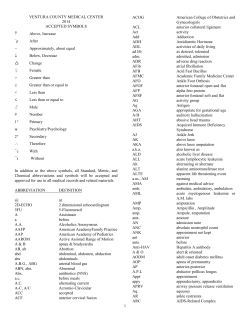
How to manage the pregnant woman with heart disease
How to manage the pregnant woman with heart disease Dr Fiona Walker, The Heart Hospital,UCLH, London Dr Sara Thorne, University Hospital Birmingham Dr Cathy Head, The Heart Hospital, UCLH, London Dr Kate English, The Yorkshire Heart Centre, Leeds Why you need to know Dr Fiona Walker Consultant Cardiologist The Heart Hospital, UCLH NHS Trust, London No conflict of interest Prevalence maternal heart disease ~ 1-3% Author / Year Country No Preg with HD Prev of Maternal HD Rh HD Congenital HD Other HD Maternal Mort Etheridge 1950-75 Australia 764 0.5% 83% 13% 4% 1.3% Sugrue 1969-7 Ireland 387 0.5% 84 13 3 0.5 N.Ireland 519 1.3% 60 31 9 0.6 87 0.3% 8 81 11 2.3 Mc Faul 1970-83 Bitsch 1977-86 Denmark Maternal heart disease UCL High-Risk Obstetric service 2001-2004 14 Acquired heart disease Congenital heart disease 131 Impact Impact of of Infant Infant Heart Heart Surgery Surgery Surgery GOS 1955 - 95 % alive 100 50 new population Natural history 0 0 1m nth r y 1 rs y 5 1 rs y 5 1980 Adult CHD patients Paediatric CHD patients 2010 Adult CHD patients Paediatric CHD patients North East Regional Database Birth 251 1877 new cases per year require LTFU in UK 1 year 16 years 91/year 72 + Infants = >Infants Follow-up O’Sullivan, Wren BCS 2000 ~ 16000 - 20000 patients in UK GUCH GUCH Population Population More adults than children with ! Fallot’s Tetralogy Almost no children with Mustard or Senning Circulatory changes in pregnancy Oxygen consumption ↑ 20% Term Plasma volume ↑↑ 45-50% 32 weeks SVR ↓ 20% 24 weeks PVR ↓ 34% 34weeks SBP ↓ 9% 28 weeks DBP ↓ HR ↑ 20-30% term SV ↑ 10-30% Term CO ↑ 30-50% Term The haemodynamic changes of pregnancy Peripheral vascular resistance CO PVR Baseline CO pregnancy Labour & delivery puerperium Maternal mortality m o rta lity pe r 1 0 0,00 0 m a te rnities 25 20 15 maternal mortality direct mortality indirect mortality cardiac 10 5 0 1975 1978 1981 1984 1987 1990 1993 1996 1999 2002 Indirect maternal mortality (deaths per 100,000 maternities) 1967-2002 12 10 8 all indirect cardiac 6 suicide cancer other indirect 4 2 0 1969 1972 1975 1978 1981 1984 1987 1990 1993 1996 1999 2002 Th H ep si s Tr au m An a ae st he tic C ar di ac Ps yc hi at ric S AF E T or rh ag e H em bo lis m ae m ro m bo Rate per million maternities Maternal mortality UK 25 20 15 10 5 0 Data from “Why mothers die – 2000-2002” www.CEMACH.org Deaths from heart disease 1952-60 & 1985-93 250 200 150 1952-60 100 1985-93 50 0 Rheumatic SBE Coronary Other Maternal Cardiac deaths 1993-99 CHD 20% cardiomyopathy aneurysm MI PHT other CEMACH 2000-2002 - 44 deaths from heart disease Substandard care in 40% Lesion specific pregnancy outcome data Maternal lesion No pregnancies No abhortion Maternal mortality % Maternal CVS comp % MS 408 0 1.5 16 38 9 11 0 68 Severe AS 16 0 6.3 69 94 Repaired CoA 21 2 0 4.8 100 Repaired TOF 62 14 0 8.1 100 Mustard 15 2 0 0 92 Fontan 32 18 0 6.1 100 74 10 22 5.4 86 PHT 53 35 5.7 Cy + / no PHT 96 49 1.0 29 87 Mechanical Valve 240 78 2.9 13 (c) 83 Tissue valve 60 9 0 3.3 94 AS (a) Marfan (a) Live births % 84 U. Thilen, SB Olsson. Eur J Obs & Gynae and Reproductive biology 75(1997) 43-50 Toronto prospective multicentre study of pregnancy outcomes in women with heart disease 562 women, 599 pregnancies, 13 centres Review at <28/40, 28-37/40, peripartum,6/52 postpartum, 6/12 post CHD (445) 74%, acquired (127) 24%, arrhythmia (27) 4%, PHT (25) 4% Baseline: 21 (4%) NYHA III, Cy+ 4 13% pregnancies complicated by pulmonary oedema, arrhythmia or stroke 0% mortality (Sui et al ; Circulation;104:July 2002) The 4 predictors of maternal cardiac events are ; • Prior episode of heart failure, TIA, CVA, or arrhythmia • NYHA ≥ II or cyanosis • Left heart obstruction (MVA < 2 cm2, AVA < 1.5 cm2, Peak LVOTO > 30 mmHg on echo) • Reduced LV function (EF < 40%) 0 predictors - risk of a cardiac event is 5% 1 predictor - risk of cardiac event 27% > 1- risk of cardiac event is 75% (Sui et al, Circulation;104:July 2002) Obstetric Problems which increase Maternal risk > Twins Pre-eclampsia Haemorrhage Premature Labour Hydramnios Motto; 6P’s Prior planning, prevents poor performance (outcome) Pre-Pregnancy counselling ; 1. The complexity of the heart lesion 2. Appreciate impact of normal haemodynamic changes on lesion 3. Detailed knowledge of prior surgical correction(s)/interventions 4. Detailed knowledge of residua / sequelae 5. A discussion re ; long-term prognosis & risk of recurrence in offspring ? 22q11 6. Optimisation of clinical status including drugs 7. Knowledge of other co-morbid medical problems Pre - Pregnancy work-up Clinical review and examination Up to date TTE / stress echo ETT or CPEX Optimise and change Meds Communicate with obstetric team & local cardiologist Plan place & frequency of reviews Labour & delivery planning • Obstetric unit or cardiac unit • Early or term • Vaginal delivery v’s C-section • Epidural / Spinal/ Natural • Haemodynamic monitoring - invasive / non-invasive • CVS drugs • Endocarditis prophylaxis • Duration of monitoring / observation post-partum “If single do not allow marriage, If fertile do not allow pregnancy If pregnant do not allow delivery(!?) If delivered do not allow breast feeding” XIX century Obstetric aphorism referring to women with heart disease Manpower for the high risk cardiac obstetric service GUCH cardiologist Obstetrician Anaesthesia Obstetric physician Haematologist Foetal medicine Neonatologist Specialist nurse Intensive care Thankyou! Fiona.walker@uclh.org
© Copyright 2025




















